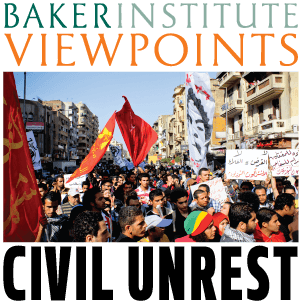A new wave of democracy in Turkey
In the sixth of a seven-part Baker Institute Viewpoints series, we evaluate the impact that a new wave of civil unrest will have on international politics.
Despite its proximity in time and location, the protests in Turkey were not just a late continuation of the Arab Spring. Unlike her neighbors that suffered staggering unemployment under the decades-long rule of dictators pre-Arab Spring, Turkey’s economy thrives under a prime minister who, by all international accounts, freely and fairly won his last three elections — most recently by a landslide. In fact, many domestic and foreign scholars credit Erdogan for bringing Turkey onto the global stage as a stable, emerging market, and a healthy portion of Turkish citizens still think highly of the prime minister.
So why all this unrest? Continue Reading

